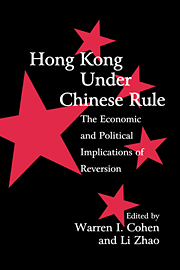Book contents
- Frontmatter
- Contents
- List of Contributors
- Introduction
- 1 Hong Kong as an International Commercial Center
- 2 Cooking the Rice without Cooking the Goose: The Rule of Law, the Battle over Business, and the Quest for Prosperity in Hong Kong after 1997
- 3 Hong Kong Faces 1997: Legal and Constitutional Issues
- 4 The Economic and Political Integration of Hong Kong: Implications for Government–Business Relations
- 5 Hong Kong and Greater China: An Economic Perspective
- 6 One Country, Two Currencies: Monetary Relations between Hong Kong and China
- 7 Political Participation in Hong Kong: Trends in the Mid-1990s
- 8 Strategic and Military Implications of Hong Kong Reversion
- 9 Hong Kong and China's Integration into the International Community
- 10 Hong Kong as a Problem in Chinese–American Relations
- 11 Post–July 1997 Challenges
- Index
Introduction
Published online by Cambridge University Press: 22 March 2010
- Frontmatter
- Contents
- List of Contributors
- Introduction
- 1 Hong Kong as an International Commercial Center
- 2 Cooking the Rice without Cooking the Goose: The Rule of Law, the Battle over Business, and the Quest for Prosperity in Hong Kong after 1997
- 3 Hong Kong Faces 1997: Legal and Constitutional Issues
- 4 The Economic and Political Integration of Hong Kong: Implications for Government–Business Relations
- 5 Hong Kong and Greater China: An Economic Perspective
- 6 One Country, Two Currencies: Monetary Relations between Hong Kong and China
- 7 Political Participation in Hong Kong: Trends in the Mid-1990s
- 8 Strategic and Military Implications of Hong Kong Reversion
- 9 Hong Kong and China's Integration into the International Community
- 10 Hong Kong as a Problem in Chinese–American Relations
- 11 Post–July 1997 Challenges
- Index
Summary
ON July 1, 1997, Hong Kong, the last vestige of British imperialism in China, will be restored to Chinese sovereignty. One hundred and fifty-five years will have passed since the end of the Opium War, when the British forced the Chinese to cede the island of Hong Kong; one hundred and thirty-seven years will have passed since they took Kowloon; and ninety-nine years will have passed since the British forced the Chinese to grant them a “lease” over the New Territories, a few square miles of the mainland across from the island. For Great Britain, the lowering of the Union Jack on June 30, 1997, will be further evidence (hardly needed) of imperial decline. For China, as the People's Liberation Army marches in the next day, as the red flag with five gold stars is raised over Hong Kong, the moment will symbolize the end of China's age of humiliation, further evidence of China's emergence as a Great Power, another step toward Chinese hegemony over East Asia.
What will the reversion of Hong Kong mean to the people of Hong Kong – and to the rest of us – who invest, trade, and shop there? Over the last fifty years Hong Kong has served as a refuge for those who fled communism in China, who escaped from the political oppression and economic hardship they experienced under the rule of Mao Zedong.
- Type
- Chapter
- Information
- Hong Kong under Chinese RuleThe Economic and Political Implications of Reversion, pp. 1 - 7Publisher: Cambridge University PressPrint publication year: 1997

